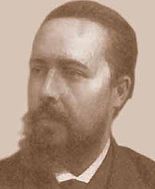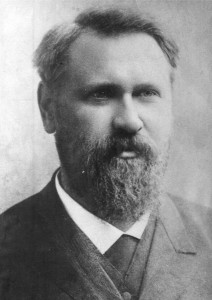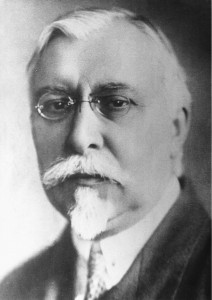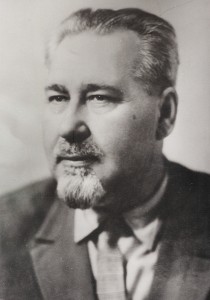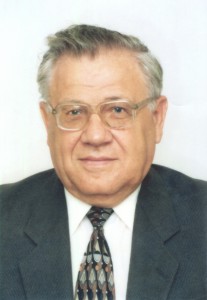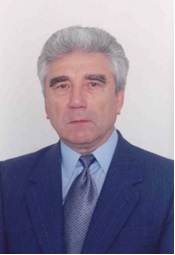It is impossible to imagine the history of the Kharkiv Technological Institute without chemistry. A number of modern chemical departments that make up the Faculty of Technology of Organic Substances (TOS) are the same age as NTU “KhPI”. In the first years of KhPI existence, their predecessors were part of the chemical department. The tasks facing them were conditioned by the needs of the development of industrial enterprises in the Donbass and the entire South of the Russian Empire. The first director of the institute V. Kirpichov involved in the teaching of chemical sciences a constellation of outstanding scientists-chemists, among whom were, organic chemist O. Eltekov, physical chemist D. Turbaba, professors I. Ponomarev, M. Chernay, specialists in the field of chemical technologies V. Gemilian, O. Lidov and others.
- Chemical audience
- Experimental table of chemical audience
- The principal’s office
It is worth noting that then the division into the usual faculties in our time did not exist. That is why the disciplines and directions, which in the future will be divided between the Faculty of Technology of Inorganic Substances and the Faculty of TOS, were taught at a single chemical department of KhPTI. All sections of chemistry were initially represented by one department of chemistry, which included a chemical laboratory, a number of offices, offices and two lecture halls located in the chemical building of the HTI. Over time, departments of technological profile were created, in particular in chemical technology with appropriate laboratories.
Among the graduating technological departments of chemical direction of KhPI were the department of technology of organic and dyes, which since 1885 was held by Professor V. Gemelian. The research facilities of the Department of Technology of Organic and Dyestuffs were distinguished by diversity. Separately, four additions contained a gas plant (with gasholders), a research plant for dry distillation of wood and an oil refining cube. In addition, the technical building housed auxiliary units – crushers, mixers, autoclaves, distilling cubes, vacuum pumps, exhausters, extractors and more.
Professor V. Gemilian was the first to give lectures on the subject “Chemistry and technology of dyes and their use.” Prior to joining KhPTI, he studied the organization of oil production, production and refining in the United States. The subject of his scientific works concerns the structure of crotonic acids, the synthesis of trifinylmethane and its homologues, and others. Author of works “On the chemical composition of Kharkiv tap water” and “Guide to the study of water, its quality and methods of purification.”
- Round flower garden
- The main building
- A group of teachers
In 1889, the department was headed by an associate professor – Professor OP Lidov, a graduate of the St. Petersburg Practical Institute of Technology, Honored Professor. With his direct participation, the first plants were built: gas, oil, and dry wood distillation. He is the author of more than 50 scientific papers in various fields of chemical technology, including the use and study of the properties of combustible minerals. Among the works of the scientist: the book “Introduction to chemical technology”, “Gas analysis”, “Short course of gas production”, “Water analysis” and others.
- Cabinet of Professor Lidov O.
- Weight
- Laboratory of qualitative analysis
From 1919, the Department of Technology of Organic and Dyes was headed by Professor MI Kuznetsov, who in 1920 – 1921 served as rector of KhTI. Back in 1908, working as a laboratory assistant, the scientist for the first time in the country began a training course on coking coal and its products. Published in 1912, a textbook in this discipline was for many years the only textbook in this field. In total, he owns more than 80 scientific works, some of which are related to semi-coking and coking technologies, gasification of low-grade fuel. E. Kuznetsov was the first to give lectures on coal coking, the first to conduct targeted training for specialists in coke plants, the author of the first textbook “Coke production. Its properties and research. Utilization of coke by-products ”, which was published in 1912. This monograph was created on the basis of an optional course of lectures given by the author at the Kharkiv Institute of Technology in 1908-1910. Realizing the importance of studying the properties of solid fuels and their introduction into pyrogenic processes, he was the first to identify the main directions and benefits of coke use, utilization of coke by-products, began research on the effects of organic solvents on coal.
Honorary Doctor of KhPI, Professor K. Belov took over the leadership of the department in 1942 at a time when he was evacuated from the teaching staff of the Institute of Chemical Technology in Chirchik, Uzbekistan. Under his leadership, studies of Central Asian coal were conducted, and recommendations for the use of chemical products of coking of defense significance were developed. K. Belov led scientific and practical work related to the development of new and intensification of existing processes of thermochemical processing of solid, liquid and gaseous combustible minerals. The most important of these developments are considered to be technologies for the capture of benzene hydrocarbons and purification of coke oven gas under pressure. The results of these works were used by Giprokoks in the design of Yasynovsky and Avdiyivsky coke plants. Under the leadership of K. Belov developed a method of processing hydrocarbon condensate, Shebelinsky natural gas for the production of gasoline, “white spirit”, diesel fuel. The obtained results became the basis for designing a plant for gas condensate rectification. In general, prof. K. Belov has published more than 130 scientific papers, has 25 inventions and patents.
A significant contribution to the development of the scientific school of the department and the training of specialists was made by Professor L. Nesterenko. They formulated scientific statements about the origin, composition and structure of coal substances and the essence of the processes of their transformation under the action of various organic solvents. L. Nesterenko headed the direction of research in the field of theoretical problems of coal chemistry, its coking processes. These ideas were unanimously adopted in the decisions of the All-Union Conference on Chemistry and Genesis of Coal in Moscow in 1950. It should also be noted a large set of studies performed using the guidance of prof. L. Nesterenko method of allocating plastic coal mass formed by heating coal to 600 ° C. This opened new wide opportunities for studying the structural features of coal substances, their hotness and coking. The destruction of coal in the centrifugal field aroused great interest and about 70 units were manufactured at the Kharkiv Coke Plant for scientific and educational institutes of the USSR and abroad. New views on the composition and molecular structure of solid minerals, as well as achievements in the field of coal chemistry prof. L. Nesterenko has published in more than 50 scientific papers and monographs “Chemistry of Solid Combustible Fossils” and “Fundamentals of Chemistry and Physics of Combustible Fossils” with co-authors.
In 1986, the head of the department was Doctor of Technical Sciences, Honored Worker of Science and Technology of Ukraine, Prof. M. Sklyar. Until the specified year prof. M. Sklyar headed the staff of the State Research Coal Chemical Institute. As a well-known scientist-chemist and specialist in the field of coal chemistry, theory and practice of coke production, he published about 200 scientific papers, 3 monographs, contributed to the development of scientific potential of the department. M.Sklyar is the author of a new technology of continuous layered coking of coal, which has no analogues in world practice. The technology has found experimental and industrial implementation at the Kharkiv Coke Plant and allows the use of the initial charge with a high content of low-calorific coal. Under the leadership of prof. Sklyara M. 2 doctoral and 13 candidate dissertations were defended.
From 2000 to 2017, the department was headed by Doctor of Technical Sciences, Professor Stanislav Slobodskoy. Since 1957, after graduating from the Kharkiv Polytechnic Institute of Life S.O. Slobodsky is inextricably linked with coke chemistry. For eight years he worked in the Design Bureau of Automation of the Giprokoks Institute, then – postgraduate study at UKHIN, after defending his dissertation he worked at UKHIN, where Stanislav Alexandrovich went from a researcher in the laboratory of modeling processes and devices to the head of the laboratory of physical research methods.
From 1996 Stanislav Oleksandrovych worked at NTU “KhPI” as a professor of the Department of Fuel and Carbon Materials, then – Deputy Head of the Department, and since 2000 – Head of the Department. Under his leadership, important research was conducted on the creation and study of new equipment and technology for the preparation of raw materials for the production of carbon materials, was created technology for producing calcium carbide using coke class 25-40 mm, carried out work to study coal, its thermochemical transformations and products. this is obtained, the most modern equipment was used.




